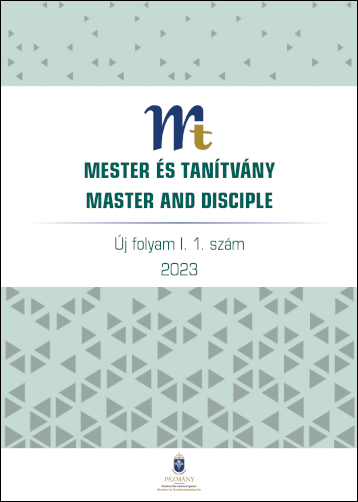Megjelent 2023-09-20
Kulcsszavak
- katolikus nevelés,
- rendszerszemlélet,
- átfogó nevelés,
- társadalmi környezet
Absztrakt
A nevelés társadalmi kihívásai a 21. században olyan gyorsasággal változtak, hogy a kutatók egyre újabb rendszeralkotási vagy legalábbis rendszerszemléleti törekvésekkel próbáltak támaszt adni a nevelés aktuális értelmezéséhez, célok, feladatok és eszközök meghatározásához. A mindennapokat mélyen átjáró, sőt globálisan mutatkozó problémák velejárójaként ismét a hitre mint tájékozódási pontra irányul az a figyelem, amely a kultúra továbbvitelét, a családi és iskolai nevelés hatásának növelését célozza. Ez a globális folyamat mutatkozik a hagyományosan evangelizált országokban ott is, ahol a keresztény hit egyre inkább peremre szorult az emberi lét értelmezésében. A tanulmány Kuminetz Géza teológus, kánonjogász professzor pedagógiai tárgyú írásaiban foglaltakat elemzi sajátosan holisztikus, integratív rendszermodelljének keretében. Ezek a nevelést a legátfogóbb módon tárgyalják a katolikus nevelés létének, átfogó társadalmi kihívásainak értelmezésével, amikhez a 20. századon át napjainkig tartóan mutatják be a keresztény nevelési eszmény modelljeit. Kuminetz Géza pedagógiai munkássága a figyelmet a klerikusok és a világi nevelők sajátos és együttes feladataira irányítja. Értelmezi a nevelőmunka hatékonyságát is, amennyiben a katolikus nevelés nem csupán hitoktatás, hanem az emberi személyt érettségére elvezető folyamat. Mindez megalapozza a Laudato ’si teremtésvédelmi enciklika alapján meghirdetett Globális Nevelési Paktum megvalósításához szükséges fejlesztéseket. A tanulmány tárgyalja, ahogyan Kuminetz Géza munkájában mai megvilágítást kap a katolikus egyetem képzési és nevelési feladata és gyakorlata, ami a hit fényébe állítva segít átfogóan értelmezni a pedagógia mai válaszait.
Hivatkozások
- Bolberitz P. (2010). Schütz Antal, a filozófus. Teológia, 2010/3–4., 168–175.
- Ferenc pápa (2015). Laudato si’ kezdetű enciklika közös otthonunk gondozásáról. Szent István Társaulat, pp. 164
- Ferenc pápa (2020). Video message of His Holiness Pope Francis on the ocassion of the meeting organised by the Congregation for the Catholic Education: „Global Compact on Education. Together to look beyound”. Pontifical Lateran University – Thursday, 15 October 2020. https://www.vatican.va/content/francesco/en/messages/pont-messages/2020/documents/papa-francesco_20201015_videomessaggio-global-compact.html
- Kozma G. (2023). Az átfogó nevelés kihívása – a pedagógusképzés felelősségéről. In Energiatudatosság és környezeti nevelés – programok a magyar felsőoktatásban. PPKE, 7–39.
- Kuminetz G. (2009). A lelkiismeret mivolta és rendeltetése katolikus szemmel. In Iustum Aequum Salutare V. 2009/3. Szent István Társulat, 19–56.
- Kuminetz G. (2010a). Schütz Antal ismeretlen arca: a pedagógiatudós. In Schütz A.: Pedagógia. Szent István Társulat, 371–419.
- Kuminetz G. (2010b). Schütz Antal, a pedagógiatudós. Teológia, 2010/3–4., 190–209.
- Kuminetz G. (2010c). Schütz Antal, a pedagógiatudós. In Katolikus Pedagógia (szerk. Kozma G.), 2010/1., 75–98.
- Kuminetz G. (2012a). Klerikusok kézikönyve I. Szent szolgálattevők, vagyis klerikusok a katolikus egyházban. Szent István Társulat, pp. 797
- Kuminetz G. (2012b): Klerikusok kézikönyve II. A papnevelés és egy klerikusi etikai és illemkódex vázlata. Szent István Társulat, pp. 587
- Kuminetz G. (2013). Egy tomista jog- és állambölcselet vázlata I. (Bibliotheca Instituti Postgradualis Iuris Canonici II. Manualia 7/1.) Szent István Társulat, pp. 835
- Kuminetz G. (2018). Egy tomista jog- és állambölcselet vázlata II. (Bibliotheca Instituti Postgradualis Iuris Canonici II. Manualia 7/2.) Szent István Társulat, pp. 937
- Kuminetz G. (2020). A tudományos élet és a személyiségfejlesztés sajátos fellegvára a katolikus egyetemen. Szent István Társulat, pp. 82. Pázmány Könyvek Sorozat 10.
- Kuminetz G. (2021). A képzés és önképzés, a nevelés és önnevelés feladatai a katolikus egyetemen. Szent István Társulat, pp. 175. Pázmány Könyvek Sorozat 11.
- Kuminetz G. (2023a). A vezetés művészete Krisztus iskolájában. Szent István Társulat, pp. 179. Pázmány Könyvek Sorozat 12.
- Kuminetz G. (2023b). Rendszerszemlélet, stratégiai tervezés és vezetés a katolikus felsőoktatásban. Szent István Társulat, pp. 118. Pázmány Könyvek Sorozat 13.
- Kuminetz G. (2023c). Világi és vallási vezetéselméletek. Jel Kiadó, 2023, pp. 368
- Kuminetz G. (2023d). Emancipálható-e a pedagógia (s persze bármely szaktudomány) a világnézeti, vallási felfogás alól? In Pukánszky B. – Sárkány P. (szerk.): Pedagógia és kereszténység. Teológiai, neveléstörténeti és nevelésfilozófiai metszetek. Szent István Társulat, 149–166.
- MKPK (2008). Felelősségünk a teremtett világért. A Magyar Katolikus Püspöki Konferencia körlevele. Szent István Társulat, pp. 110
- Molnár T. (1996). Az értelmiség alkonya. Akadémiai Kiadó, pp. 318
- Németh A. (2005). A magyar pedagógia tudománytörténete, Gondolat, 332
- Németh G. (2018). Bioetikai vázlatok. Bioetikai és más életerkölcsi kérdések. Szent István Társulat, pp. 422
- Pálvölgyi F. (2014). Az erkölcsi nevelés új perspektívái. Az értékközpontú pedagógia szerepe és feladatai korunk plurális társadalmában. L’Harmattan Kiadó, Sapientia Szerzetesi Hittudományi Főiskola, pp. 262
- Schütz A. (2014). Pedagógia. Szent István Társulat, pp. 419
- Szabó J. L. (2013). Gondolatok a katolikus nevelésről – szülőknek és pedagógusoknak. Kairosz Kiadó, pp. 214

